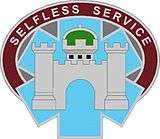Landstuhl Regional Medical Center
| Landstuhl Regional Medical Center | |
|---|---|
|
Aerial view of LRMC | |
| Active | March 9, 1953 – present |
| Country | Germany |
| Allegiance | United States |
| Branch | Inter-service (United States Army Medical Command) |
| Type | Hospital |
| Nickname(s) | LRMC |
| Motto(s) | "Selfless service" |
| Commanders | |
| Current commander | Colonel Timothy L Hudson |
| Insignia | |
| Distinctive Unit Insignia |
 |
| Landstuhl Regional Medical Center | |
|---|---|
| United States Army Medical Command | |
| Geography | |
| Location | Landstuhl, Rhineland-Palatinate, Germany |
| Organisation | |
| Care system | Military |
| Hospital type | General |
| Services | |
| Beds | 310[1] |
| History | |
| Founded | 1953[2] |
| Links | |
| Website | ermc.amedd.army.mil/landstuhl |
The Landstuhl Regional Medical Center (LRMC) is an overseas military hospital operated by the United States Army and the Department of Defense. LRMC is the largest military hospital outside of the continental United States. It is located near Landstuhl, Germany, and serves as the nearest treatment center for wounded soldiers coming from Iraq and Afghanistan. In addition, it serves military personnel stationed in the European Union as well as their family members.
The medical center also serves as a stop-over (medevaced via the nearby Ramstein Air Base) for serious casualties from Iraq and Afghanistan before being flown to the United States.
With the United States military's gradual withdrawal from Iraq and Afghanistan over the years, the number of casualties have dwindled and Landstuhl was downgraded to a Level III trauma center in May 2014.[3] The Navy disbanded its Expeditionary Medical Unit later that same year.[4]
History
Founded in 1953, the hospital was known as the 2nd General Hospital, or Landstuhl Army Medical Center. During the 1990s, the United States Army Europe underwent a reorganization, and the hospitals in Frankfurt, Berlin, Nuremberg, and other bases were gradually closed down, or were downsized to clinics. In April 1993, a group of 288 Air Force personnel augmented the staff, thus making Landstuhl a joint medical unit. By 1997, it was the U.S. military's only medical center in Europe, and it then became known as Landstuhl Regional Medical Center.[5]
Organ donation
Landstuhl is one of the top hospitals for organ's donations in its region in the EU. Roughly half of the troops who died at Landstuhl from combat injuries from 2005 through 2010 were organ donors. That was the first year the U.S. military allowed organs to be donated by American troops who died in Germany from wounds suffered in Iraq or Afghanistan. From 2005 through 2010, 34 American military members who died at Landstuhl donated a total of 142 organs, according to the German organ transplant organization, Deutsche Stiftung Organtransplantation. In 2010, 10 of the 12 American service members who died at Landstuhl were donors, giving 45 organs.[6]
See also
References
- ↑ "LRMC Facts". Retrieved 2009-06-01.
- ↑ "LRMC History". Retrieved 2009-05-29.
- ↑ "With fewer war injuries, Landstuhl becomes Level III trauma center". Stars and Stripes. May 28, 2014.
- ↑ "Navy disbands Landstuhl medical unit as casualties dwindle". Stars and Stripes. September 26, 2014.
- ↑ Sarnecky, Mary T. A contemporary history of the U.S. Army Nurse Corps. Government Printing Office. pp. 343–4. ISBN 9780160869136.
- ↑ Jones, Meg. "A Soldier's Death Gives Life to Another Man". Milwaukee Journal Sentinel.
- Fichtner, Ullrich (2007-03-14). "A Visit to the US Military Hospital". DER SPIEGEL. Retrieved 2007-03-20.
- Jones, Meg (2011-04-24). "A Soldier's Death Gives Life to Another Man". Milwaukee Journal Sentinel. Retrieved 2011-05-12.
- Shanker, Thom (2012-06-10). "Landstulh Hospital to be Replaced but with What?". New York Times. Retrieved 2013-05-12.
External links
![]() Media related to Landstuhl Regional Medical Center at Wikimedia Commons
Media related to Landstuhl Regional Medical Center at Wikimedia Commons
Coordinates: 49°24′15″N 7°33′37″E / 49.40417°N 7.56028°E
